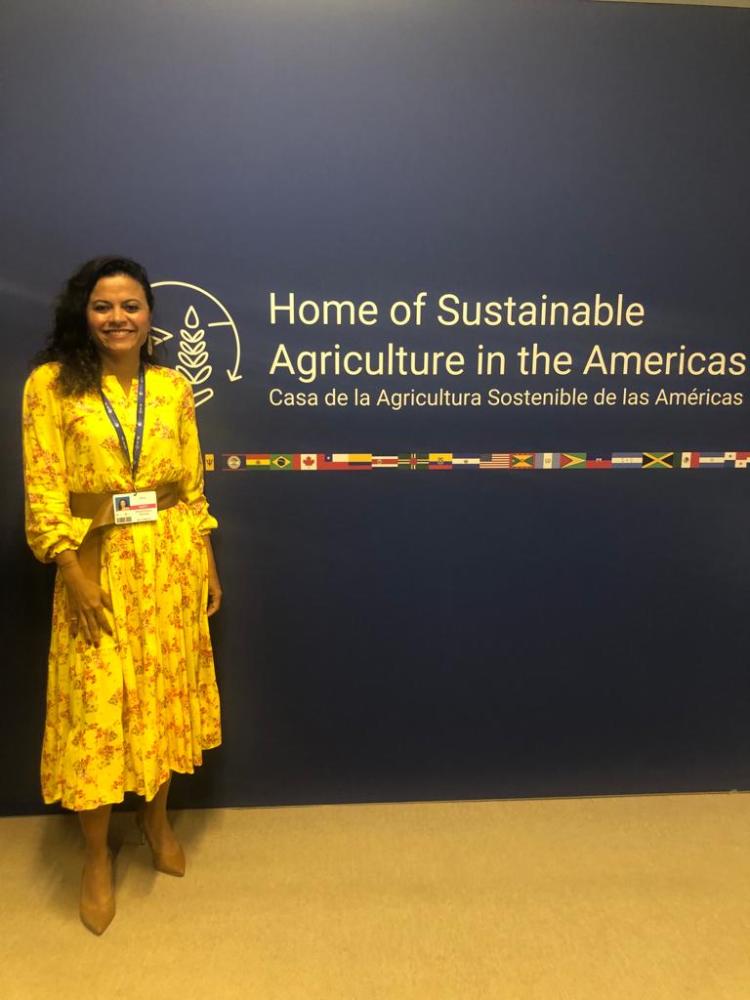Brazil praises document on cattle farming presented at IICA pavilion at COP28 and affirms that the negative narrative regarding the sustainability of agriculture must be confronted with data and science

Dubai, 4 December 2023 (IICA) – There is only one way to confront the negative narrative regarding the climate impact of our livestock farming, and it is with scientific data. This was stated by the Secretary of Innovation, Sustainable Development, Irrigation and Cooperatives of the Ministry of Agriculture and Livestock of Brazil, Renata Miranda, who celebrated the document on livestock production presented at the pavilion of the Inter-American Institute for Cooperation on Agriculture (IICA) at COP28, the UN climate summit currently taking place in Dubai.
The study, reflected in the document “Cattle farming and climate change in the Americas: in search of net zero emissions” written by Argentine scientist Ernesto Viglizzo, warns that publications that hold cattle farming accountable for a significant part of climate change are wrong, as they incorrectly attribute emissions that come from other sectors of the economy, such as industrial, transportation, residential, distribution or domestic consumption, to this activity.
Viglizzo is a recognized international expert on issues of livestock, soils and climate change and holds a PhD from the Catholic University of Leuven (Belgium). He is also a member of the National Academy of Agronomy and Veterinary Medicine of Argentina, and has been a guest lecturer on climate and environmental problems in the Americas at Harvard and Oxford Universities, and at universities in Latin America. He has also often been invited as editor and co-editor of special issues of prestigious international scientific journals such as Springer-Nature and Elsevier
According to Viglizzo, cattle farming has a much smaller impact on global warming than is alleged, if the measurements adequately consider the greenhouse gas emissions that correspond to this activity -during the animal husbandry period- and when excluding those that come from other sectors of the economy and are incorrectly attributed to cattle farming.
In this document, the researcher also points out that only the emissions from livestock should be attributed to beef chains, and that livestock producers cannot be held accountable for emissions that do not strictly depend on their activities.
Representing the Government of Brazil, Secretary Miranda participated in the launch of the document at the Home of Sustainable Agriculture of the Americas pavilion, which IICA installed at COP28 as a way to visibilize the efforts that regional agriculture carries out for the mitigation of and adaptation to global warming.
At the launch, she pointed out that “we are constantly overloaded with information about how much livestock production affects and influences climate change. We are being bombarded with this as if livestock were the villain of the climate crisis. This report provides clear numbers and does a very good job of showing that this is not the case.”
She went on to add: “We should be discussing how much food production and livestock are being affected by extreme weather events that compromise our ability to provide food to the population.”
The Brazilian official explained that “we often hear the narrative of European countries or countries that work with intensive livestock farming, in confined systems that are very different from ours, This document by Viglizzo makes a comparison between extensive and intensive models from an emissions perspective, making it very clear that they should not teach us how to raise livestock, because our management models have a much more positive impact, and can even offset carbon emissions more than those feedlot-type models.
Furthermore, she stressed that “the work is very much aligned with our public policy in Brazil, and we must explain very clearly at all forums, as we did recently at the FAO Sustainable Livestock Conference, that there are several livestock farming models in the world and that there is no way to define a single pattern. “Each country will have to look for the most efficient model in terms of production and climate, while respecting local characteristics.”
Miranda also highlighted the importance of IICA's role in promoting and disseminating sustainable practices.
“There is only one way to confront the negative narrative regarding the climate impact of our livestock farming, and it is with scientific data. This is why the study is so important. When there is well-constructed, consolidated, published scientific data, that is adequately communicated, the recognition is a natural result. Today, agriculture in the South must invest more quickly in science, thus generating data and high-impact documents, and presenting this at forums where best practices are discussed and decided,” she explained.
To conclude, she stated that “IICA plays a fundamental role in the articulation of countries in the Americas and between these countries and financing agencies. IICA is therefore a key partner, creating bridges for high-impact results in the region.”
More information:
Institutional Communication Division.
comunicacion.institucional@iica.int